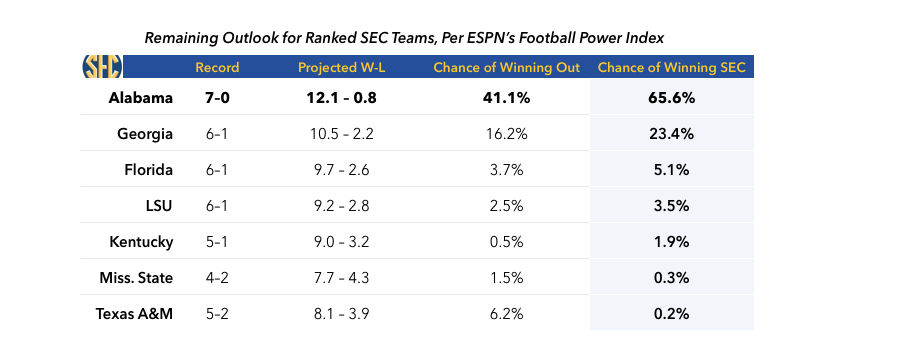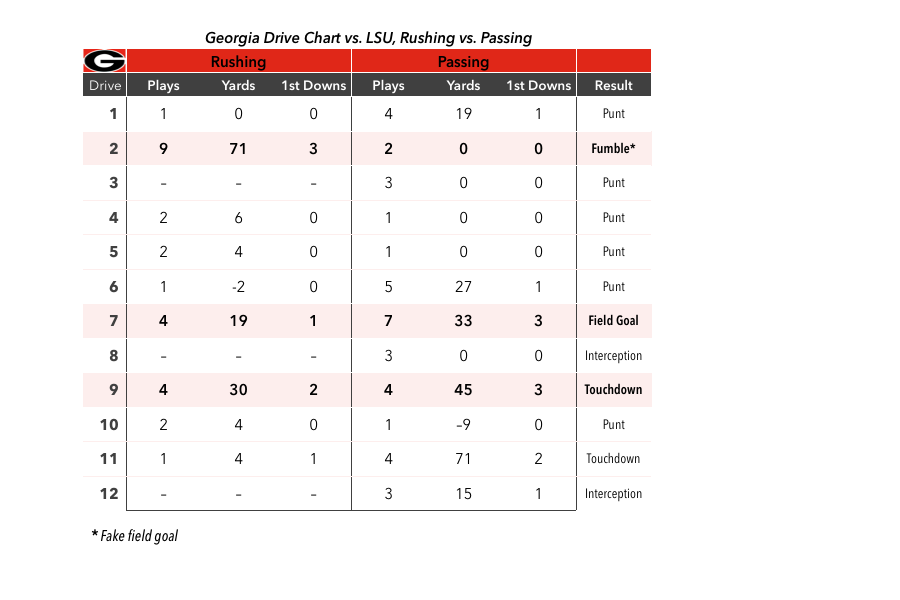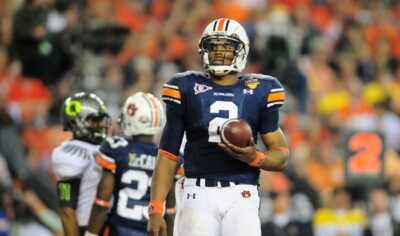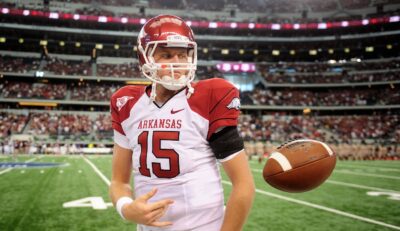
Monday Down South: At midseason – surprise – it’s still Alabama and everybody else
By Matt Hinton
Published:
Well, I think it’s safe to say LSU is no longer in any danger of finishing 6-6. Midway through the 2018 regular season, that’s about all that’s safe to say.
The Tigers’ 36-16 pasting of Georgia toppled one of the last remaining pillars of the preseason consensus — the one that held up the Bulldogs as obvious favorites to run the table en route to a winner-take-all rematch with Alabama in the SEC Championship Game — and left mostly shrug emojis in its wake.
The second half of the season is the wild frontier.
Georgia’s face plant in Baton Rouge left it effectively in a three-way tie atop the SEC East alongside a pair of preseason afterthoughts, Florida and Kentucky, both of which landed in the top 15 of the latest AP poll and look like far more viable challengers in the East than anyone could have imagined in August. (Seriously, Kentucky?) LSU, which spent the entire offseason staring down grim expectations, surged defiantly into the top five with visions of a playoff bid suddenly not looking so farfetched.
Meanwhile, the expected challengers in the West, Auburn and Mississippi State, are a combined 2-5 in conference games and all but mathematically eliminated from the division race. Texas A&M, picked fourth in the preseason media poll, remains alive.
By this point in the season the signals should be discernible from the noise, but enough of what happens to be true right now is surprising enough that it’s hard to gauge how much of it is likely to hold six weeks from now.
The SEC’s stingiest defenses at the turn reside in Starkville and Lexington. Auburn, a running back factory that cranks out 1,000-yard rushers even in the worst of times, ranks dead last on the ground vs. FBS opponents. The much-anticipated “Year of the Quarterback” has yielded rapidly diminishing expectations across the league: Far from making a leap as upperclassmen, headliners Drew Lock, Nick Fitzgerald, Jake Bentley, and Jarrett Stidham are all lagging significantly behind their 2017 pace. Jake Fromm just turned in arguably the worst performance of his young career in his team’s biggest regular-season test, potentially putting his job at risk.
Kirby Smart is on the defensive about his decision-making; Ed Orgeron is being reevaluated as a master motivator; Gus Malzahn, again, is being sized up for the hot seat.
Which brings us, as always, to Alabama, the fixed north star around which the chaos is oriented and defined. While the midseason mood across the rest of the conference ranges from resignation to cautious optimism to burgeoning panic, there’s one standing assumption you can still set your watch by:

If anything, in light of Georgia’s lapse at LSU giving Bama only 2-out-of-3 odds to claim the conference crown seems conservative. (Two other teams, Clemson in the ACC and Appalachian State in the Sun Belt, have slightly better chances.) The Tide are a near-unanimous No. 1 this week in both traditional polls, where they earned 121 of 125 first-place votes, and the more analytical methods, including runaway margins per FPI, S&P+, Jeff Sagarin, Kenneth Massey, and Football Reference’s Simple Rating System.
On a turbulent weekend across the country, their 39-10 win over Missouri was such smooth, routine sailing — Bama led 30-10 at the half and outgained Mizzou by 353 yards overall — that even their “problems” tended to highlight how absurdly well the season is going. The offense was forced to punt (once) for the first time in three weeks and settled for three field goals in the red zone. On two other occasions they were stopped on downs. Tua Tagovailoa looked almost mortal (almost), committing his first turnover of the season and setting a personal low for completion percentage (54.5) before leaving in the third quarter with a wonky knee.
That Tua also averaged 12.0 yards per attempt with 3 TD passes in the game’s first 20 minutes was just, you know, par for the course. Meanwhile, the Tide failed to score at least 45 points for the first time this year and just barely covered the spread. The literally flawless game unfolding in Nick Saban’s mind remains elusive in real life, the only reason (Tua’s health notwithstanding) that their win probability in any of its remaining games is anything less than 100 percent.
It is true that Bama usually has looked unbeatable right up to the moment it got beat, which has arrived at one point or another in each of the past eight seasons and always as a surprise. The schedule so far has been much squishier than usual; that was an issue for last year’s team, too, which proved to be unexpectedly relevant down the stretch.
LSU’s ceiling has been revised vastly upwards almost overnight; the Tigers will get the Tide in Baton Rouge and (unlike Bama) have already proven their potential against another blue-chip opponent. Mississippi State took the Tide to the wire last year and boasts the No. 1 scoring defense in the nation. And despite Saturday’s setback, Georgia will be heavily favored in its final five games and still has a chance to arrive at the SEC title game with all of its overarching goals still in play, looking more or less exactly like the team we expected 48 hours ago.
Still, Alabama’s margin for error with Tagovailoa behind center is as large as it has been under Saban, and through seven games it still seems to be widening by the week.
At some point, presumably, that will cease to be the case, the Tide will find themselves in a four-quarter fight, and the narrative surrounding Tua will shift from his absurd statistical pace to his poise and grit, etc., in the face of adversity. But if six weeks from now we’re still waiting on that moment to arrive as they roll into the Playoff for the fifth year in a row, at least we’ll know it’s the only ending that makes perfect sense.
Notebook
Around the conference.
LSU 36, Georgia 16
It might have come as a shock — the margin, especially — but there’s no secret as to how this one went down: The Tigers owned the line of scrimmage, pounded out nearly 300 yards rushing, converted 4-of-4 on fourth downs on eventual scoring drives, dominated time of possession, pressured and confused Jake Fromm, turned three Georgia turnovers into points, committed zero turnovers of their own, and and generally looked like the platonic ideal of an LSU football team. Statistically, QB Joe Burrow continues to keep just enough in the tank to get where he’s going; in every other way, he continues to be exactly what a team with a deep backfield and blue-chip defense needs.
The only hitch in that won-in-the-trenches narrative is that, based strictly on the box score, Georgia’s ground game actually fared just fine when given the chance: UGA’s top two backs (D’Andre Swift and Elijah Holyfield) averaged a healthy 6.7 yards per carry without a negative play … but came in for a grand total of just 12 carries between them while Fromm visibly struggled en route to a career-low in pass efficiency. Did Georgia unnecessarily abandon its bread-and-butter?
In one sense, yes. Almost all of the Bulldogs’ 77 rushing yards as a team came on their second possession of the game, an 11-play, 71-yard march on which they effectively ran the ball down LSU’s throat — Swift and Holyfield carried on eight consecutive plays to open the drive, for 61 yards and three first downs. (The drive stalled when UGA went to the air in the red zone, resulting in back-to-back incomplete passes by Fromm and a subsequent fake field goal attempt on 4th-and-9 that blew up in the Bulldogs’ face.) After that, zilch:

Georgia abandoned the run for exactly one drive: The follow-up to its first long march, on which the Bulldogs went three-and-out on three consecutive passes. But their next two drives both began with back-to-back runs that set up third-and-manageable for Fromm, who failed to convert in either case. (If you’re keeping track, Fromm hit his first pass of the day for a 19-yard gain and proceeded to miss 9 of his next 10 over the Bulldogs’ first five possessions; the lone completion in that stretch went for no gain.) By possession No. 6, UGA trailed 16-0 with the clock running out in the first half, and the onus after halftime shifted full-time onto Fromm to throw them back into it.
The silver lining for Georgia going forward is that, in the brief window of time that it was relevant, the ground game gave an encouraging glimpse of its potential against a top-shelf defense: There’s no reason to believe Holyfield and Swift can’t still be productive, Chubb/Michel-level workhorses in big games running behind the Bulldogs’ gargantuan offensive line. Even one successful third-down conversion on the Bulldogs’ series of three-and-out possessions in the first half might have dramatically shifted the course of the game.
But Fromm’s inability to make those chain-moving plays recalled his abrupt cold streak in last year’s regular-season loss at Auburn, which is the kind of thing that’s harder to overlook in a sophomore. If he can’t operate efficiently outside of his comfort zone against a Playoff-calber defense, the temptation to get Justin Fields up to speed in time for the postseason is only going to keep growing.
https://twitter.com/ftbeard_17/status/1051249925504155653
Alabama 39, Missouri 10
One of the defining traits of Alabama’s offense this season is its initial burst — just how quickly and efficiently it’s demoralizing opponents out of the gate: The Tide have scored touchdowns on their opening possession in all seven games, including 4 TDs within the first minute of possession and two on the first play from scrimmage. Saturday’s opening salvo against Mizzou, an 81-yard strike from Tagovailoa to human rocket Jerry Jeudy, came on the second play. By contrast, their 3-minute, 7-play drive to open the season against Louisville seems positively glacial.
Incredibly, Bama’s 30-10 lead at the half was nearly its narrowest halftime margin of the season, barely edging out the Tide’s 18-point advantage over Texas A&M in Week 4:
Alabama 2018 Halftime Margins
- vs. Louisville: 28-0
- Arkansas State: 40-0
- at Ole Miss: 49-7
- Texas A&M: 31-13
- UL-Lafayette: 49-0
- at Arkansas: 41-14
- Missouri: 30-10
Another way to look at those numbers: In all but one game (Week 6’s 65-31 win over Arkansas), the halftime margin alone was larger than the opponent’s point total for the game. By that point, even the teams that managed to weather the initial blow are resigned to mitigating the damage.
Tennessee 30, Auburn 24
If there’s any single play that sums up Auburn’s ongoing collapse on offense it was Jarrett Stidham’s second interception against the Vols, a desperate, drive-killing decision in the second quarter on a play that started badly and ended worse:
https://twitter.com/ftbeard_17/status/1051158847149109248
The play call is a Malzahn staple, one he’s run often over the years to good effect, including a big gain in last year’s Iron Bowl upset over Alabama and its then-defensive coordinator, Jeremy Pruitt. (The same play produced a wide-open receiver last week against Mississippi State, whom Stidham subsequently missed in another emblematic moment.) Not this time: Tennessee CB Baylen Buchanan recognized the gambit immediately, revving up his blitz as soon as Auburn WR Ryan Davis (at the top of the formation) began his motion into the backfield and arriving in Stidham’s face almost simultaneously with the ball to force a panicked throw.
The pressure was an Xs and Os victory for Pruitt; the decision to blindly unload the ball into the waiting arms of a UT defense was all Stidham.
Tennessee didn’t convert the gaffe into points; in fact, Auburn responded on its subsequent possession with a rare big play to move in front, 17-10, before going into hibernation for most of the rest of the game. (A later Stidham fumble resulted directly in points in the third quarter, supplying the Vols with what proved to be the winning touchdown.) But if this was the worst loss of the Malzahn era — a home-field flop at the hands of a last-place opponent, in a must-win situation for the Tigers on the heels of last week’s loss in Starkville, all but confirming this season as a lost one — it would be hard to come up with a more fitting moment. Malzahn’s familiar, misdirection-heavy scheme hasn’t fooled anyone all year.
Auburn has bigger problems at the moment than deception, namely getting opposing defenders blocked; Stidham has been sacked a dozen times in the past four games, the kind of number that can affect a quarterback’s confidence whether he’s under pressure or not, and the running game has been downright anemic.
At 4-3, though, the most looming concern is the schedule: The Tigers still have to endure November trips to Georgia and Alabama, plus a home date with Texas A&M, and have shown absolutely no sign of the late surge that lifted them to wins over all three of those teams last year.
This weekend’s trip to Ole Miss could be the difference between bowl eligibility and a free fall that leaves even casual Auburn fans intimately familiar with the parameters of Malzahn’s buyout.
Superlatives
The best of Week 7, non-Tagovailoa division …
1. Alabama DL Quinnen Williams. Williams is the rep for Alabama’s entire d-line on a dominant night against Missouri: As a unit, the front seven rebounded from a subpar outing at Arkansas by tallying 8 tackles for loss (including 4 sacks) with 7 QB hurries and held Mizzou running backs to 97 yards rushing on a meager 3.2 per carry.
Individually, Williams continued his breakout season in the middle with — officially — 7 tackles, 2 TFLs, a pair of QB hurries, and a sack that resulted in a safety when he put the hapless lineman attempting to block him one-on-one in Drew Lock’s lap.
https://twitter.com/ftbeard_17/status/1051267331312115712
For the season, Williams is Pro Football Focus’ highest-graded defensive player in the nation at any position.
2. LSU’s offensive line. The Tigers methodically imposed their will on Georgia, grinding out more yards on the ground (275) on more yards per carry (5.4) than any opposing offense against the Bulldogs over the past two years. The Tigers produced a 100-yard rusher (Clyde Edwards-Helaire, with 145), converted four 4th-and-short conversions, racked up a 7:30 advantage in time of possessions, and established a smash-mouth blueprint for the rest of the year.
Good luck throwing the ball when Grant Delpit is in the area. pic.twitter.com/YjFISmmIWL
— CBS Sports College Football ? (@CBSSportsCFB) October 13, 2018
3. LSU DB Grant Delpit. Delpit’s usual hyperactive presence on defense resulted in 7 tackles, a TFL, a forced fumble, and one extremely athletic pass broken up. If he’s not the best safety in America over the first half of the season, I certainly haven’t seen one better.
4. Ole Miss QB Jordan Ta’amu. Ta’amu produced a ridiculous night at Arkansas even by his standards, accounting for a career-high 528 total yards (387 passing, 141 rushing) and 3 TDs in a come-from-behind, 37-33 win. All five of Ole Miss’ touchdown drives on the night covered at least 75 yards, including a pair of late marches that consumed nearly the length of the field — 84 yards and 97 yards, respectively — to erase a 9-point deficit in the closing minutes. On those two drives alone Ta’amu was 7-of-10 passing for 106 yards with 42 yards rushing, setting up both decisive touchdowns with scrambles inside the Arkansas 15-yard line.
5. Florida RB Lamical Perine. Perine emerged from a crowded backfield rotation against Vanderbilt with a career-high 214 yards from scrimmage (121 rushing, 93 receiving) in a weird, 37-27 win in Nashville. For all of the Gators’ missed opportunities, the combination of Perine and Jordan Scarlett (115 yards on 7.1 per carry) accounted for nearly half of the team’s 576 total yards; together with last week’s 215-yard rushing effort against LSU, at minimum Florida is beginning to forge a formidable run-first identity heading into a suddenly very winnable game vs. Georgia.
Honorable Mention: Texas A&M TE Jace Sternberger, who racked up 145 yards on 7 catches in the Aggies’ win over South Carolina. … Alabama WRs Jerry Jeudy and De’Vonta Smith, who combined for 247 yards and 2 TDs against Missouri on more than 35 yards per catch. … Bama DB Saivion Smith, who picked off 2 passes. … Arkansas RB Rakeem Boyd, who accounted for 145 yards from scrimmage against Ole Miss on just 9 touches, including a 69-yard TD run. … LSU kicker Cole Tracy, who hit all 5 of his field-goal attempts against Georgia and accounted for 18 points in all. … Tennessee DL Kyle Phillips, who had a team-high 9 tackles and helped supply the pressure on Jarrett Stidham that led to a forced fumble and subsequent touchdown. … And Tennessee QB Jarrett Guarantano, whose career day against Auburn earned him the highest QB grade in the nation from PFF put any doubts about his status as the Vols’ QB of the future to bed.
Quote of the Week
Auburn LB Deshaun Davis, on the Tigers’ disappointing record at midseason.
Deshaun Davis is in complete shock that #Auburn is 4-3 after 7 games: "If I was a betting man … I'd be naked under a bridge somewhere." @_Davis_Boy12 pic.twitter.com/RmfnQgSzGV
— Kyle Burger (@kyle_burger) October 13, 2018
Matt Hinton, author of 'Monday Down South' and our resident QB guru, has previously written for Dr. Saturday, CBS and Grantland.







